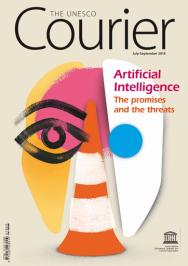مقال
في خدمتنا، وليسَ على حسابنا

نحن متجهون لا محالة نحو مستقبل آلي وذكاء اصطناعي بإمكانات تكاد أن تكون بلا حدود. ومن ثم يتعين علينا تقويم جميع التداعيات الأخلاقية الناجمة عن هذه التكنولوجيا الحديثة، والتصدي للتحديات القانونية والاجتماعية غير المسبوقة التي قد تنشأ.
بقلم تي وي آنغ ودفنا فينهولز (اليونسكو)
ترغمنا التكنولوجيات الحديثة أحيانا على التساؤل حول ما يؤلّف البعد البشري. وعلى أية حال، هذا صحيح في ما يتعلق بالذكاء الاصطناعي باعتبار أن تداعياته المحتملة تستدعي اجتهادا فكريا يتناسب مع أهميتها. وبعد أن طارد هذا المفهوم مخيلتنا الجماعية على مدى عدة عقود، ها أنه اليوم يقتحم حياتنا.
إن التقدم الذي أحرزه حديثا الذكاء الاصطناعي، لا سيما في مجال تعلم الآلة والتعلم العميق، يبرهن على قدرة هذه الأنظمة على التفوق على البشر في مجالات عديدة، بما في ذلك المهام التي تقتضي مقداراً معيناً من الاستدلال المعرفي. وهذا يدل على أن الذكاء الاصطناعي قد يمثل مصدراً هائلاً للتقدم والمنفعة للبشرية، ولكنه في نفس الوقت، قد يزعزع الدعائم الاجتماعية والاقتصادية والسياسية للمجتمع البشري.
وقبل أن نتساءل حول التداعيات الأخلاقية للذكاء الاصطناعي، لا بد من تحديد مكوناته في الوقت الحاضر. عندما نتحدث عن الذكاء الاصطناعي، نعني عموما «الذكاء الاصطناعي المحدود»، أو «الذكاء الاصطناعي الضعيف» الذي تم تصميمه لإنجاز مهمّة محددة، ألا وهي التحليل وتيسير تداول المعلومات، مثل الحث على شراء بضائع عن طريق الإنترنت استناداً إلى مشتريات سابقة. وهذا النمط من الذكاء الاصطناعي الضعيف موجود بالفعل، ولكنه سوف يصبح أكثر تعقيدا وسوف يتغلغل أكثر فأكثر في حياتنا اليومية.
نحن لا نتحدث هنا عمّا يُسمى بـ«الذكاء الاصطناعي القوي» أو «الذكاء الاصطناعي العام»، الذي تصفه الكثير من الروايات وأفلام الخيال العلمي، والذي يُفترض أنه قادر على القيام بجميع أصناف النشاط المعرفي البشري، وحتى على بلوغ درجة نسبية من الوعي، حسب ما يذهب إليه بعض الخبراء. غير أننا لم نبلغ أي توافق حول جدوى استخدام مثل هذا الذكاء الاصطناعي وآفاقه.
جمع للبيانات لا نهاية له
يقتضي تعلّم الآلة والتعلّم العميق قدراً كبيراً من البيانات التاريخية والبيانات التي يتم تجميعها آنيا، إذا أردنا أن يكون نظام الذكاء الاصطناعي قادرا على «التعلم» على أساس ما اكتسبه من «تجربة». كما أن تطوير هذين النمطين من التعلّم يحتاج إلى بُنى تحتية تسمح للذكاء الاصطناعي بتحقيق مهامه أو أهدافه استنادا إلى ما تعلّمه. وينبغي لنا أن نأخذ في الحسبان، عندما نفكر في التداعيات الأخلاقية للذكاء الاصطناعي، المحيط التكنولوجي المعقد الذي يحتاجه ليشتغل والذي يشمل التجميع المستمر للبيانات الضخمة الصادرة عن إنترنت الأشياء، وتخزينها في السحاب المعلوماتي، واستخدامها من قِبل الذكاء الاصطناعي حتى يقوم بتغذية عملية «التعلم» وتنفيذ التحاليل أو الأنشطة في المدن الذكية، والسيارات المستقلة، والروبوتات، وغيرها.
وكلّما تعقّد التطور التكنولوجي، كلّما زادت المسائل الأخلاقية التي يثيرها تعقيدا. وحتى إذا بقيت المبادئ الأخلاقية ثابتة، لا يُستبعد أن يتغيّر بصفة جذرية أسلوبنا في تناولها، ولو أدى ذلك، عن قصد أو عن غير قصد، إلى إعادة النظر فيها بشكل خطير .
وعلى سبيل المثال، قد يتغيّر تماما تصوّرنا لحرمة الحياة الشخصية ولمفهومَي السريّة والاستقلالية. وبفضل التطبيقات أو الآليات التي توصف بأنها ذكية والتي أصبحت تشكل أدوات الاتصال الخاصة بشبكات التواصل الاجتماعي، مثل فيسبوك أو تويتر، فإننا نقوم بالكشف عن معلوماتنا الشخصية بصفة «حرّة» أو طوعية، دون معرفة تامة للاستخدامات الممكنة لهذه البيانات، ولا للأطراف التي سوف تستخدمها. ثم تُنقل هذه البيانات إلى نُظم للذكاء الاصطناعي يطورها بالأساس القطاع الخاص. وتبقى هذه البيانات إسمية، بحيث أن المعلومات المتعلقة بمُيولاتنا وعاداتنا يمكن استغلالها لخلق نماذج سلوكية تتيح للذكاء الاصطناعي مثلا أن يوجه لنا رسائل ذات الطابع السياسي، أو أن يبيع لنا تطبيقات تجارية أو أن يخزّن معلومات تتعلق بمُعالجتنا الطبية.
الأفضل والأسوأ
هل انتهت حرمة حياتنا الشخصية؟ وماذا عن أمن البيانات وهشاشتها إزاء أعمال القرصنة؟ هل بإمكان الدولة أن تستحوذ على هذه البيانات لفرض الرقابة على السكان، مع احتمال أن يكون ذلك على حساب حقوق الإنسان الفردية؟ ألا يمثل هذا المحيط المعتمد على الذكاء الاصطناعي الذي يراقب ميُولاتنا ويستخدمها ليعرض علينا مختلف الخيارات، تهديدا لحريتنا في الاختيار وقدرتنا على الإبداع؟
وهناك سؤال آخر له أهميته وهو: إلى أي مدى تحمل البيانات المستخدمة من قِبل الذكاء الاصطناعي في مجال «التعلّم» في طياتها أفكارا موروثة ومسبقة من المحتمل أن تسفر عن «قرارات» - يتّخذها الذكاء الاصطناعي - قد تكون من باب التمييز أو الشجب؟ إن هذا من شأنه أن يُضعِف نُظم الذكاء الاصطناعي بصفة خاصة تلك التي تتولى العلاقات مع الجمهور أو توفر الخدمات الاجتماعية. علينا أن ندرك أن بعض البيانات، مثل تلك التي يتم تطويرها على شبكة الإنترنت، تحتوي على معلومات تعكس أفضل ما في البشرية كما أسوَأه. ومن ثم، لا يمكن الاعتماد على الذكاء الاصطناعي دون غيره لاستخلاص الدروس من هذه البيانات دون المخاطرة على الصعيد الأخلاقي. وبالتالي، لا يمكن الاستغناء عن التدخل البشري المباشر.
هل من الممكن تلقين الذكاء الاصطناعي سلوكاً أخلاقياً؟ في نظر بعض الفلاسفة، هناك تجارب - لاسيما تلك التي لها طابع جمالي وأخلاقي - ملازمة للجنس البشري، وهي بالتالي ليست قابلة للبرمجة. ويرى البعض الآخر أنه إذا كانت للأخلاق صفة عقلانية، فمن الممكن أن تخضع للبرمجة، شريطة احترام حرية الاختيار. ولم يحصل لحد الآن توافق حول مسألة الاعتماد على العقل دون غيره لتلقين البشر القيم والأخلاقيات. فكيف يمكن إذن تحقيق التوافق عندما يتعلق الأمر بتعلّم الآلة! وإذا افترضنا أنه سوف يصبح، في يوم ما، من الممكن برمجة ذكاء اصطناعي حتى يكتسب طابعاً أخلاقياً، فما عسى أن تكون هذه المبادئ الأخلاقية؟ هل هي المبادئ التي يتبعها مصممو البرمجيات؟ إن تطوير الذكاء الاصطناعي بين أيدي القطاع الخاص بالأساس، ولهذا القطاع أفكار حول الأخلاقيات لا تتماشى بالضرورة مع تلك التي يفضلها المجتمع.
وحتى يشتغل الذكاء الاصطناعي لخدمة مصالحنا وليس على حسابنا، لا بد أن نشرع في مناقشة موضوعية تأخذ في عين الاعتبار وجهات النظر الأخلاقية لجميع الأطراف المعنية. وإزاء التقلبات التي قد يثيرها الذكاء الاصطناعي في المجتمع، ينبغي أن نحرص على أن يراعي الإطار الأخلاقي الذي سوف يندرج فيه تطوره المستقبلي، مسألة أوسع نطاقاً، ألا وهي المسؤولية الاجتماعية.
By Tee Wee Ang and Dafna Feinholz (UNESCO)
Every once in a while, we encounter a technology that gives us pause to consider what it means to be human. The advent of AI requires us to engage in deep reflection on its potentially far-reaching impacts. Although the concept behind this technology has been in our collective imagination for decades, it is only now becoming an entrenched reality in our lives.
Recent advances in AI technology − especially those related to machine learning in general and deep learning in particular − have shown that AI-enabled systems can outperform humans in terms of efficiency and effectiveness in many areas, including tasks that require some degree of cognitive reasoning. As such, AI has the potential to bring about tremendous progress and benefits for humanity, while at the same time creating disruptions in the current socio-economic and political arrangements of human society.
When we think about the ethical implications of AI, we should be realistic about what AI is and is not, today. Generally, when we talk about AI we are referring to “narrow AI” or “weak AI”, which is designed to accomplish a specific task − such as analysing and improving traffic flow; making online recommendations of products, based on previous purchases, etc. Such “narrow AI” is already here − and will become increasingly complex and integrated into our daily lives.
For now, we are not considering what is termed “strong AI” or Artificial General Intelligence (AGI) depicted in many science-fiction stories and movies − which would purportedly be able to accomplish the full range of human cognitive tasks, and some experts argue, would even include traits of “self-awareness” and “consciousness”. Currently, there is no consensus on whether AGI is feasible, let alone when it will be achieved.
Never-ending data collection
Machine learning and deep learning approaches require a large amount of historical and real-time data for an AI-enabled system to “learn” from “experience”, and an infrastructure for an AI to implement its goals or tasks, based on what it has learnt. This means that when we consider the ethical implications of AI, we must also take into account the complex technological environment that is required for AI to function. This environment includes the constant collection of big data through the Internet of Things; the storage of big data in the cloud; the use of big data by AI for its “learning” process; and the implementation of AI’s analyses or tasks through smart cities, autonomous vehicles, or robotic devices, etc.
The more complex technological development becomes, the more complex the ethical questions raised will be. While the ethical principles do not change, the ways in which we address them can change radically. As a result, these principles could be severely compromised, knowingly or unknowingly.
Our notions of privacy, confidentiality and autonomy, for example, could change radically. Through smart devices and apps that have become instruments of social networks like Facebook and Twitter, we are “freely” and willingly giving out our personal information, without properly understanding the potential uses of this data and by whom. This data is then fed into AI-enabled systems that are primarily being developed by the private sector. This data is not anonymized, so that the information about our preferences and habits can be used to create patterns for behaviour that allow an AI-enabled system to deliver political messages, sell commercial apps, keep track of some of our health-related activities, etc.
The best and the worst
Would this mean the end of privacy? What about data security and vulnerability to hacking by criminals? Could this data also be co-opted by the State to control its population, perhaps to the detriment of the individual’s human rights? Would an AI-enabled environment that constantly monitors our preferences and provides us with a range of options based on those preferences, limit the extent of our autonomy of choice and creativity in some way?
Another important question to consider is whether the data that is being used by an AI-enabled system to learn contains embedded biases or prejudices, which might lead the AI to make decisions that result in discrimination or stigmatization. AI systems tasked with social interactions or the delivery of social services would be particularly vulnerable to this. We must be cognisant of the fact that some data, such as that generated on the internet, contains information that reflects both the best and the worst of humanity. Therefore, relying on an AI-enabled system to learn from this data is itself insufficient to ensure an ethical outcome – direct human intervention would be necessary.
Could an AI-enabled system be taught to be ethical? Some philosophers argue that some experiences – such as aesthetics and ethics – are inherent to human beings, so they cannot be programmed. Others propose that morality can be enhanced through rationality, and therefore can be programmed, but free choice must be respected. There is currently no consensus about whether ethics and morality can be taught even to humans, based only on rational thinking, let alone to an AI. Even if an AI was eventually programmed to be ethical, whose ethics would we use? Would they only be the ethics of the developers? Given that the development of AI is primarily driven by the private sector, it is imperative to consider the possibility that the ethics of the private sector could be inconsistent with the ethics of society.
If we are to ensure that AI works for, instead of against us, we must engage in a comprehensive dialogue that includes the different ethical perspectives of everybody affected by it. We must make sure that the ethical framework we use to develop AI also takes into account the larger questions of social responsibility, to counterbalance the potential disruptions to human society.
Tee Wee Ang and Dafna Feinholz
Programme Specialist, Bioethics and Ethics of Science at UNESCO, Tee Wee Ang (Malaysia) worked in design engineering and engineering management before joining UNESCO in 2005.
Chief of Section, Bioethics and Ethics of Science at UNESCO, Dafna Feinholz (Mexico) is a psychologist and bioethicist by training. She was formerly Secretary General of Mexico’s National Commission of Bioethics.








